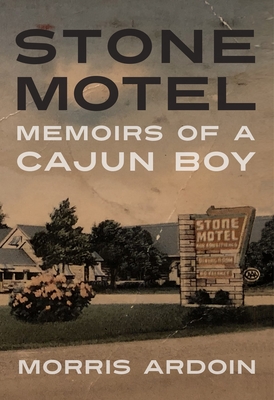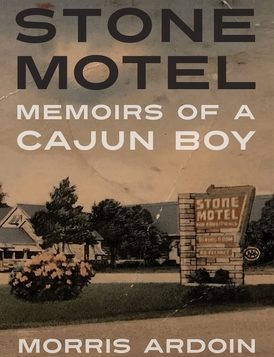 STONE MOTEL
STONE MOTEL
Memoirs of a Cajun Boy
by Morris Ardoin
University Press of Mississippi. 255 pages, $28.
THIRTEEN-YEAR-OLD Morris Ardoin likes to cook and play canasta. He hates sleeping on the ground in a tent, cannot kill an animal with a gun, and dreads hunting trips with his father and older brother. He notices the things that can make life “magical”: a dining room chandelier, translucent plastic curtains with flowers printed on them, the smell of lavender in a dresser drawer. From a young age, Morris is aware that he is not a “proper boy.” For someone growing up in a small town in Louisiana in the early 1970s, this is a problem. Stone Motel is a memoir that reveals what it was like for a gay man to come of age before the changes wrought by Stonewall reached the American South.
The Stone Motel was built in Eunice, Louisiana, in the late 1940s. The name came from its façade of artificial stone. Zanny Ardoin, Morris’ father, purchased the motel in 1967. The father and the motel dominate this book. Zanny, one of fifteen children, grew up in the Great Depression. After his mother’s death, his father sent him and one brother to live on a nearby farm, where they slept in a barn until they were old enough to enlist in the Army. His experiences in World War II left Zanny with PTSD, long before the condition was named and treated. When Eliza Mae Thompson, Morris’ mother, married Zanny, she suspected he might be “mean.” She was right. Zanny brutalized his eight children physically and mentally. He had a particular animus for Morris, who he felt “didn’t know how to be a boy” and needed to be taught toughness. His children refer to Zanny as Daddy. It is jarring to hear them use this term in reference to a man who would slap, punch, and whip them with little or no provocation.
Zanny and Eliza are able to operate the motel because they have the free labor of their children. The motel is open 24/7. Before and after school, the children clean rooms, do laundry, cut grass, take garbage to the dump, and check in guests. The work is relentless and hard, especially in the hot Louisiana summer. Morris, his older twin sisters, and a younger brother bond while playing canasta around the dining room table in their free time. With the resilience of children, they create a refuge that enables them to talk with each about their difficult lives and find humor in the adult world surrounding them. Morris believes the motel, which was shabby by today’s standards and occasionally used by “short timers” for sexual trysts, taught them about life and prepared them to handle the challenges that came their way as adults.
Morris Ardoin’s childhood memories are far from idyllic, but they contain moments of grace. Morris was blessed with loving grandparents on his mother’s side of the family. Their small, four-room house provided an escape from his father’s unpredictable wrath. “It was the only place in my small world where I experienced full, unconditional love and honest, reliable security that would not disappear tomorrow.” Mémère, his grandmother, who never learned to read or write and spoke Cajun Franglais, a mixture of French and English, rescued Morris from the brutality of his childhood. This woman, who addressed everyone as “cher” or “pauvre bête,” instilled in him a sympathy for other people that is the hallmark of his writing.
This sympathy enables Ardoin to write a chapter in the voice of his father in an attempt to understand a man tormented by demons he could not control. It leaves him “crushed with pity” the last time he sees Zanny alive, in an assisted living facility. This sympathy also produces the most remarkable chapter in the book, one in which Morris enters the mind of his mother—a woman who married too young, had too many children, and lived “someone else’s idea of a life”—and tells her story in her own stoic voice. It is a powerful, moving piece of writing, testimony to the special bond that can exist between a gay man and his mother.
Stone Motel is at times repetitious, recounting the same incident several times from different perspectives. By his own admission, Ardoin has a reporter’s mindset. He relies heavily on detailed lists, such as the products on grocery store shelves, songs on the radio, or the appliances in a studio apartment, to depict the “harvest gold” America of the 1970s. Knowing he fell short of the standards of masculinity that surrounded him, the young Morris tried to be as inconspicuous as possible around “menfolk.” This reluctance to reveal himself may be the reason his memoir contains disappointingly little information about his own sexual awakening. Morris Ardoin knew he had to escape the hostile world into which he was born before he could find himself as a gay man. He succeeded in this quest, only to discover, as this brave, complex memoir makes clear, that his past remains an inextricable part of the person he has become.
Daniel Burr lives in Covington, Kentucky, and is a frequent contributor to this magazine.






